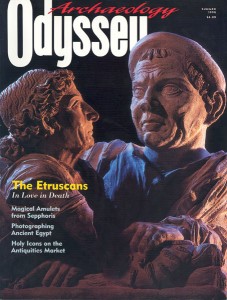Earliest Appearance of Abbreviation for the Israelite God
Sidebar to: Welcome to the World of Magic!
As Tom McCullough and Beth Glazier-McDonald note in the accompanying article, the silver amulet they describe contains several theophoric elements representing the ineffable name of the Israelite God, usually written in scholarly literature as Yahweh and referred to as the Tetragrammaton, for the four Hebrew letters of which it is comprised, YHWH. These theophoric elements in the amulet are YAH, YH, YHW and, they add, perhaps YYY and YY (see translation in the last sidebar to this article). In this context, these theophoric elements are abbreviations of the divine name. If this name is too holy to be pronounced—as it was (and is); the high priest uttered it only once a year, in the Holy of Holies of the Temple on Yom Kippur, the Day of Atonement1—it was also too sacred to be written in full. Hence, the abbreviations.
Even in prayers and in scriptural recitations, the divine name remains unpronounced. Instead, the word Adonai (Lord) is substituted for the four consonants with which Yahweh is spelled. But among observant Jews, even Adonai is considered too sacred to be used outside of prayer. When not praying, observant Jews refer to ha-Shem, “the Name,” rather than Adonai.
Similarly, in Hebrew prayer books to this day, the divine name is frequently abbreviated simply by two Y’s (or yods, as this letter is called in Hebrew). In prayer, the two yods are automatically pronounced Adonai by worshipers.
Already a library member? Log in here.
Institution user? Log in with your IP address.

